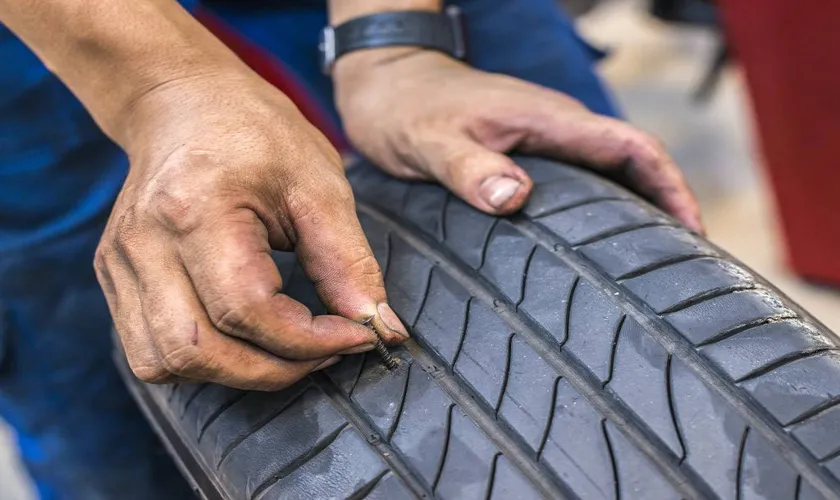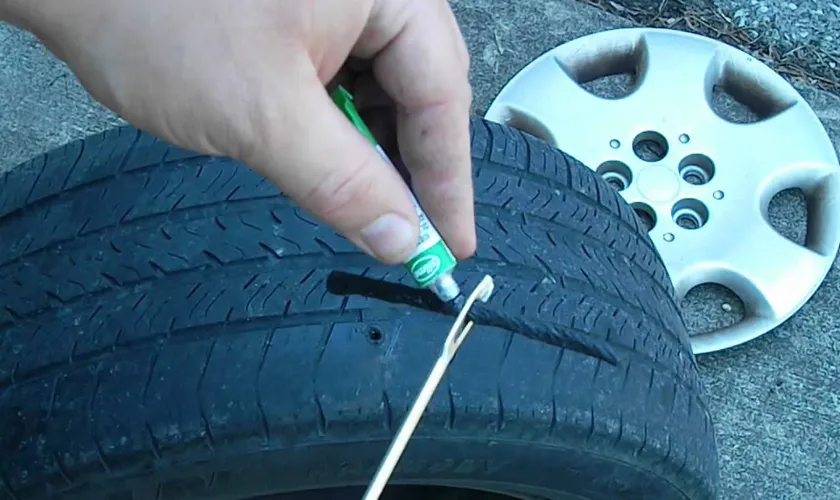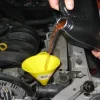Have you ever been driving down the road and heard a loud pop, followed by the sensation of your car suddenly pulling to one side? It’s a feeling that no driver wants to experience – a punctured tire. While it’s an inconvenience, it’s something that any responsible driver needs to prepare for, both in terms of time and money. So, how much does it usually cost to fix a punctured tire? The answer isn’t a simple one, as there are a number of factors that can influence the cost of repair.
For example, the type of tire you have – whether it’s a standard tire, a run-flat tire, or a high-performance tire – can affect the cost. In addition, the severity of the puncture and the location of the tire on your car can also play a role. Generally speaking, a standard tire puncture repair will usually cost somewhere between $10 and $30.
However, if the damage is more extensive, such as a sidewall puncture or damage to the tire’s bead, the costs could be much higher. In these cases, it may be more cost-effective to replace the tire entirely. It’s worth noting that the cost of fixing a punctured tire can also vary depending on where you take your car for the repair.
Tire shops and auto repair centers may charge different rates, so it’s worth shopping around for the best price. Additionally, if the puncture happens while you’re on the road, you may need to pay a premium for emergency roadside assistance. Overall, while a punctured tire can be an unwelcome expense, it’s one that drivers need to be prepared for.
By understanding the factors that can impact the cost of repair, and taking the time to shop around for the best price, you can minimize the impact on your wallet.
Table of Contents
Factors affecting the cost of a punctured tire repair
If you’re wondering how much it costs to fix a punctured tire, there are several factors that can affect the overall expense. Firstly, the type of tire and its size will play a significant role. A high-performance sports car tire will likely be more expensive to repair than a standard economy car tire.
Secondly, the severity of the puncture can impact the price. If the puncture is small and located in the center of the tread, it may be repairable for a lower cost. However, if the puncture is deeper or located in the sidewall, it may require a more extensive repair or even a full tire replacement.
Thirdly, the location where you take your vehicle for repairs can affect the price, as different repair shops may charge varying rates. Moreover, whether you choose to repair or replace the tire can also impact the cost. In general, repairing a punctured tire is typically less expensive than replacing it entirely.
Ultimately, the cost to fix a punctured tire will depend on a combination of these factors, and it’s best to get a quote from a reputable repair shop for an accurate estimate.
Severity of the damage
When it comes to repairing a punctured tire, several factors come into play when determining the cost. The severity of the damage is a significant factor because the extent of the puncture will determine whether a tire can be repaired or requires replacement. If a puncture is small and located on the tread, it can be repaired easily and cost-effectively.
However, if the damage is extensive or the puncture occurs on the sidewall, where the structural integrity of the tire is compromised, the tire will likely need to be replaced, increasing the overall cost of the repair. Other factors that can affect the cost of a punctured tire repair include the type of tire, the age of the tire, and the location of the puncture. As such, it is essential to take these factors into account before deciding on the best course of action when faced with a punctured tire.
So, if you find yourself in such a situation, it’s advisable to seek advice from a professional tire technician to help you make an informed decision.

Type of tire
When it comes to getting a punctured tire repaired, the cost can vary depending on several factors. One of the main factors that affects the cost is the type of tire. Different types of tires have different structures and materials, which can impact the complexity of the repair process, and therefore, the cost.
For example, run-flat tires are designed to be driven on even after a puncture, which means they require a more intricate repair process that can take longer, and therefore, cost more. On the other hand, standard tires can usually be repaired more easily and at a lower cost. Additionally, larger tire sizes tend to be more costly to repair as they require more materials and labor.
So, the next time you get a punctured tire repaired, keep in mind that the type of tire you have will likely affect the cost of the repair.
Location and accessibility of the puncture
When it comes to repairing a punctured tire, there are several factors that can influence the overall cost of the job. One of the most significant factors is the location and accessibility of the puncture itself. If the puncture is in a spot that is easy to reach and repair, such as the center of the tread, the cost will likely be lower.
However, if the puncture is located in a hard-to-reach area, such as near the sidewall or shoulder, the cost will likely be higher. This is because repairing a tire in these areas may require special tools and techniques that can add to the overall cost. Additionally, if the tire has been driven on while flat or if the puncture is larger than usual, the repair may be more extensive and costly.
Ultimately, the cost of repairing a punctured tire will depend on a variety of factors, but the location and accessibility of the puncture are some of the most significant factors to consider.
Average cost of tire repair
If you’ve ever experienced a punctured tire, you know it can be a frustrating experience. Not only is it inconvenient, but it can also be costly to fix. The average cost of tire repair can vary depending on the size of the puncture and the type of tire.
Generally, a small puncture that can be fixed with a patch or plug will cost around $20 to $30. However, if the damage is more extensive, it may require a full tire replacement, which can cost upwards of $100 or more. It’s important to keep in mind that preventative measures such as proper tire maintenance and regular inspections can help to reduce the likelihood of a puncture and save you money in the long run.
So if you find yourself with a punctured tire, don’t panic, just be sure to have it inspected and repaired by a qualified professional as soon as possible to avoid any further damage.
National average
When your tire needs repairing, the cost can vary depending on where you live and the severity of the damage to the tire. On average, the national average cost of tire repair ranges from $10 to $30 per tire. However, this cost can often be higher if the tire has a more severe puncture or if there is damage to the sidewall.
It’s important to get your tire repaired as soon as possible to avoid any further damage, as driving on a damaged tire can be dangerous. In fact, it’s important to remember that the cost of repairing or replacing a tire is a small price to pay when it comes to your safety on the road. So if you notice any damage to your tires, don’t hesitate to get them checked out by a professional.
Cost breakdown
When it comes to tire repair, the average cost can vary based on a few different factors. One of the biggest factors is the type of tire that needs to be repaired. For example, a simple puncture in a passenger car tire could cost anywhere from $10 to $30 to repair, while a larger commercial tire could cost upwards of $50 to repair.
Additionally, the cost of labor and the location of the repair shop can also impact the final price. It’s important to get a quote from a reputable tire shop before agreeing to any repairs, and to also consider the cost of a new tire if the damage is severe. Overall, the average cost of tire repair can range from a few dollars to over a hundred depending on the circumstances.
Do-it-yourself tire repair vs professional service
If you accidentally puncture one of your tires, one question you may have is whether you should attempt a DIY tire repair or seek professional service for the repair. While DIY repair kits are available, it’s important to consider the cost of properly repairing the tire. Typically, a DIY kit will cost between $5 and $20, but this doesn’t guarantee a permanent fix.
Depending on the severity of the puncture, a professional tire repair can cost anywhere from $15 to $50 per tire. Additionally, a professional repair comes with the reassurance that the repair will be completed properly and safely, reducing the likelihood of future issues. So, while a DIY repair may seem like the cheapest option at first, it’s important to weigh the cost against the risk and potential consequences of a subpar fix.
Ultimately, it’s best to consult with a professional before deciding on the best course of action for your punctured tire.
Advantages and disadvantages of DIY repair
When it comes to fixing a tire, you have two options: DIY repair or professional service. Both have their own advantages and disadvantages. DIY repair saves you money and time, as you don’t have to wait for an available appointment or drive to a service center.
You also have the satisfaction of fixing it yourself! However, DIY repair can be dangerous if not done correctly, and you’ll need to invest in the right tools and materials. Additionally, you may not be able to find the exact tire match, which can affect the safety and performance of your vehicle. On the other hand, professional service ensures that the repair is done safely and effectively, as mechanics have the necessary training, experience, and equipment.
They also use high-quality and compatible materials for your tire. However, professional service can be costly and time-consuming, as there may be a long wait time or a need to travel to the service center. It’s also important to research and choose a reputable and trustworthy mechanic.
Ultimately, the decision between DIY repair and professional service depends on your level of experience, confidence, and available resources. If you have the knowledge, skills, and tools, DIY repair can be a great option. However, if you’re uncertain or don’t have the necessary resources, it’s best to seek professional service for your safety and peace of mind.
Risks of improper repair
If you’re tempted to tackle a tire repair project yourself, think twice before diving in. Improper repair can be risky, not just for your vehicle, but for your safety as well. While DIY options may seem appealing, a professional service is often the better choice.
When you attempt a repair yourself, there’s a higher risk of improper installation or incorrect fitting, leading to unpredictable results on the road. This can be dangerous if the tire fails or loses air pressure while you’re driving. Plus, a DIY repair may not be as comprehensive as professional service, leading to additional repair costs down the road.
Trusting a tire professional to handle a repair ensures that the job is done properly and to the highest standard of safety. Remember, proper tire maintenance and repair are critical to keep you and your passengers safe on the road.
Benefits of professional repair
When it comes to tire repair, some people may opt for a do-it-yourself approach to save money. While this may seem like a good idea at first, professional repair services actually offer several benefits that make it worth the extra cost. For one, professional technicians have the proper training and equipment to accurately assess and repair tire damage, ensuring that the repair will last and be safe for driving.
Additionally, professional services often offer warranties or guarantees on their work, providing peace of mind that your repair will hold up over time. On the other hand, DIY repairs can be risky, especially if you don’t have experience or access to the right tools. In the end, investing in professional tire repair can save you money and hassle down the line, while ensuring your safety on the road.
So, the next time you’re faced with a damaged tire, it may be wise to leave it in the hands of the professionals.
Conclusion
In the end, the cost to fix a punctured tire will depend on many factors including the severity of the puncture, rim damage, and type of tire. But one thing is clear, investing in a good quality tire repair kit or carrying a spare tire can save you from the headache of being stranded on the side of the road with a flat. So, the next time you’re tempted to skimp on tire maintenance, remember – an ounce of prevention is worth a pound of cure, and a punctured tire can be a costly reminder of that.
“
FAQs
What causes a punctured tire?
A punctured tire can be caused by a sharp object, such as a nail or glass, road debris, or even a faulty valve stem.
Can a punctured tire be repaired?
In most cases, a punctured tire can be repaired if the puncture is not too large and is located on the tread rather than the sidewall.
How do I know if my tire needs to be replaced instead of repaired?
If the puncture is larger than a quarter inch or if it is on the sidewall of the tire, it cannot be repaired and the tire will need to be replaced.
How long does it take to fix a punctured tire?
The time it takes to fix a punctured tire can vary depending on the severity of the puncture and the availability of the repair technician, but it typically takes less than an hour.
How much does it cost to fix a punctured tire?
The cost to fix a punctured tire can vary depending on the severity of the puncture and where you take your vehicle, but it typically ranges from $20 to $40 for a simple repair.
Can I drive on a punctured tire?
It is not recommended to drive on a punctured tire, as it can cause further damage and possibly lead to a blowout. Pull over to a safe location and have the tire repaired as soon as possible.
How can I prevent getting a punctured tire?
You can prevent punctured tires by avoiding driving over debris on the road, maintaining proper tire pressure, and having your tires inspected regularly for wear and tear.



